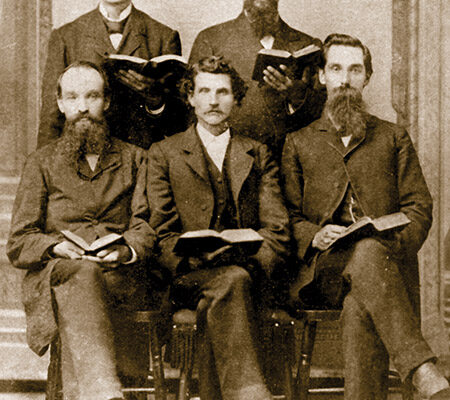As a teenager in the 1940s, I attended a Salem branch of the Church of God (Seventh Day). At that time the Church was preaching the imminent return of Jesus and the third angel’s message as a warning of impending judgment upon worshippers of the beast (Revelation 14:9, 10).
Other elements of this teaching were that the Antichrist was preparing to enforce the “mark of the beast” upon the Christian world (13:11-16). Nations of the north were preparing to descend upon Palestine to destroy the Jews (Ezekiel 38). But the United States and her European allies would go to Israel’s defense, leading to the Battle of Armageddon (Revelation 16:16). In the midst of that war, Jesus would descend to the Mount of Olives (Zechariah 14) as the seventh plague of great hailstones fell (Revelation 16:21).
The Church’s presentation of gruesome events at Jesus’ return scared me. On the other hand, I observed that New Testament writers anticipated His second advent with joy. Paul thought Jesus might return in his lifetime
(1 Corinthians 15:51) and expected to receive a crown of righteousness (2 Timothy 4:8). Peter wrote of receiving an inheritance that never spoils or fades (1 Peter 1:4).
Awesome and spectacular
We rejoice in Jesus’ personal promise to return: “If I go and prepare a place for you, I will come back . . .” (John 14:3). That promise was repeated when Jesus ascended into heaven (Acts 1:11). The Holy Spirit within us guarantees Christ’s return and the receiving of our inheritance (Ephesians 1:13, 14).
The return of Jesus will be a spectacular display of God’s power and glory! Every saint who ever lived will witness the awesome sights and sounds announcing it: “For as lightning that comes from the east is visible even in the west, so will be the coming of the Son of Man
. . . . They will see the Son of Man coming on the clouds of the sky, with power and great glory,” accompanied by a loud command, the voice of the archangel, and the trumpet call of God (Matthew 24:27, 30, 31).
Paul taught that the saints living at Jesus’ coming will have no advantage over saints resting in the grave. The dead will be raised in time to be awed by the sights and sounds of His coming. The living and resurrected saints will be caught up together to meet the Lord and to dwell with Him eternally (1 Thessalonians 4:15-17). These words provide comfort, not fear, to God’s people.
The hope of the saints of all ages will be realized when Jesus comes in resurrection power. Paul wrote that Christ was the first to be raised from death to immortality and that the saints will follow: “so in Christ all will be made alive. . . . each in his own turn: Christ, the firstfruits; then, when he comes, those who belong to him” (1 Corinthians 15:20, 22, 23).
Paul happily referred to the vindication of saints at Jesus’ coming as “the day he comes to be glorified in his holy people and to be marveled at among all those who have believed”
(2 Thessalonians 1:10).
Jesus’ return ushers in the timeless kingdom of God, ending the ravages of sin and death: “Then the end will come, when he hands over the kingdom to God . . . For he must reign until he has put all his enemies under his feet” (1 Corinthians 15:24, 25). The last enemy is death. This transfer of authority introduces the new heaven and earth, signifying that ageless kingdom when “the dwelling of God is with men, and he will live with them. . . . There will be no more death or mourning or crying or pain, for the old order of things has passed away” (Revelation 21:1-4).
Maintaining hope
Though Jesus’ return will be all joy for the faithful, we should expect more turbulence in the world between now and that final event. Many of us are accustomed to an affluent, peace-loving, and tolerant — even permissive — society where we enjoy practicing our faith without fear. But that is changing. Christians are no longer respected for their moral values. As they speak out on issues like homosexuality and abortion, they are looked upon as intolerant radicals. The persecution and martyrdom of believers in many places around the world could become common to our society before long.
We must not become disillusioned by the threat of being tried for our faith. Jesus advised us that the world hates, persecutes, and kills (Matthew 24:9; John 15:18, 19). “Do not be afraid of those who kill the body,” He counseled, “Rather, be afraid of the One who can destroy both soul and body in hell” (Matthew 10:28).
Our commitment of faith and trust in the Lord Jesus Christ must be more than lip service. Like the centuries-old community of Christians in Mosul, Iraq, who refused to compromise or convert to Islam but fled their homes and possessions under the threat of death, we must be completely committed to the Lord’s work!
Our hope is not in this godless world, in possessions or position, but in Jesus. He told Martha, “I am the resurrection and the life. He who believes in me will live, even though he dies; and whoever lives and believes in me will never die” (John 11:25, 26). Jesus counseled His disciples not to worry about the necessities of life. God knows our needs and will provide (Matthew 6:25-33).
The author of Hebrews stated Jesus’ promise and a proper response to it: “‘Never will I leave you; never will I forsake you.’ So we say with confidence, ‘The Lord is my helper; I will not be afraid. What can man do to me?’” (Hebrews 13:5, 6).
Paul’s joyful expectation of Jesus’ coming was not shaken by his impending martyrdom: “Now there is in store for me the crown of righteousness, which the Lord, the righteous Judge, will award to me on that day — and not only to me, but also to all who have longed for his appearing”
(2 Timothy 4:8).
Like Paul, we too may await Christ’s promised return with positive anticipation. Whatever trials come to Christians between now and then can be faced with confidence, without fear!BA








